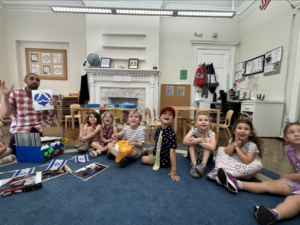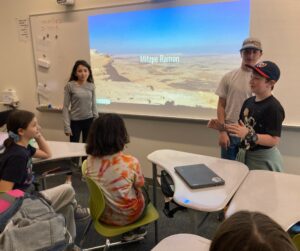An Overview of MILTON’s New Israel Studies Curriculum
October 11, 2024
October 11, 2024
Over the last two years, MILTON has implemented a formal Israel Studies program across North Campus. While historically many classes at MILTON have discussed Israel’s history and culture, and the middle school had dedicated courses for Israel education, this program introduces a trajectory of courses dedicated to these topics throughout grades 3-8. Below, we share an overview of the curriculum.
Elementary and Middle School Principal Lisa Schopf says, “Since the school’s beginning, we have been dedicated to learning about Israel in our classrooms, integrating connections with the land, the people, the culture, and the history of Israel in organic ways through our studies. When we started the middle school in 2017, a dedicated scope and sequence of Israel education was developed by Shoshana Sfarzada z”l, Aliza Sandalon, and me with a focus on building an understanding of the creation and growth of the State of Israel from pre-State years through today. In recent years, Gila Efrati has created a curriculum that she has taught in grades 3-5 that focuses on the multiple expressions of diversity in the land, people, and cultures in the Land of Israel. This year we have taken steps to further integrate the studies in the Elementary and Middle schools to provide a unifying thread of learning and experience for our students.”
Co-Curricular Programs Director and Middle School teacher Dr. David Derin is the chair of the program. As department chair, David supervises the program’s scope and sequence, ensuring that it builds sequentially from year to year on North Campus.
Early Elementary School
Israel studies are also an integral part of learning for our youngest students. According to South Campus Hebrew and Judaic Studies Department Chair, Vered Goldstein, “Israel education has a strong presence throughout South Campus, playing a significant role in our Hebrew and Judaic studies curriculum. For example, in the first few weeks of first grade Hebrew, we utilize Israeli schools’ traditional units on getting to know our classroom and school environment, including the same songs and stories. When learning about Jewish holidays, we explore how they’re celebrated in Israel and celebrate them in a similar way. When studying the stories in the Tanakh, we explore where those stories are situated geographically, giving us the opportunity to compare modern and ancient Israel and the historic events that evolved into today’s customs.”
Elementary School
Israel Education classes in Grades 3-5 rotate through a trimester schedule, with each grade spending one trimester per year on Israel Studies. According to Gila Efrati, Israel Studies in Grade 3 focuses on the theme: “Israel as a diverse country.”
“We expose them to ethnic, cultural, and geographic diversity: different music, food, languages, bodies of water, climate, and more,” she said.
Grade 4 has a similar learning goal of cultural diversity. “We are exploring three or four topics: desserts, ethnic groups, traditional and modern clothing, and music and dances,” Gila said. “I want them to know that there is not one Israeli culture or group of people—everyone is unique, with different traditions.”
This is the second year Grades 3 and 4 have formalized their Israel Studies curriculum. Grade 5 is inaugurating a new, dedicated program this year as well that focuses on the parliamentary governmental system, which parallels the Grade 5 General Studies curriculum exploring the U.S. government. “Since this is an election year, it’s more exciting,” Gila added.
“I want students to connect to Israel and to know that Israel has 10 million people, with many diverse cultures. I want them to understand more nuances,” Gila said.

A Kindergarten lesson.
Middle School
According to David Derin, “Elementary School focuses on culture and learning information, creating a basis of knowledge, and Middle School focuses more on critical thinking and the historical timeline.”
Grade 6 students have Israel Studies for their first trimester. “We are focusing on diversity of the land—different geographic regions, and what defines a place,” David said. “They are also studying different kinds of borders, political and geographic, and why communities are established in certain places. We are looking at both the modern and biblical lands to learn why geographic distinctions changed throughout time.”
Next year, MILTON will launch a new Grade 7 curriculum.“Seventh grade will focus on different visions and expressions of Zionism and Zionist, [specifically] religious Zionism, political Zionism, and labor Zionism. We will be contemplating questions such as: How did these contribute to the development and establishment of Israel? How are these ideas expressed today?” David said. Previously, this was a short series of lessons incorporated into the Grade 6 curriculum.
This year, Grade 8 will spend two trimesters in Israel Studies. David says they will learn “key events in the history of Israel and how they contribute to the Israel the students know today culturally, politically, and religiously, from the first Zionist Congress in 1897 to October 7, 2023.”
Previously, Grade 8 studied Israel’s history from its founding to now, while Grade 7 studied the British Mandate through the establishment of the State of Israel. This new curriculum combines the two. “We connected the dots of the timeline for students, and we now go deeper into how events come together,” David says.
Grade 8 ends with two “capstone” experiences: a trip to Israel and a mock Knesset, where students represent different parties, learn their platforms, devise policies on a specific topic, and hold a vote.
“My goal is to deepen students’ knowledge and awareness of Israel, and, as they get older, give them the tools and exposure to build a relationship with it—without pre-determining exactly what kind of relationship,” David said. “Some students have a gut relationship with Israel, but that is not going to be true for everyone. We want them all to have an ever-evolving relationship that can grow with them. We want students to think critically and to have the skills to analyze and contextualize what they read and hear in the news, around a Shabbat table, or on their high school or college campus.” Our school-wide Israel curriculum builds this connection and knowledge from age 4-14 in ways that are newly interconnected during their years at MILTON and ever more essential after graduation.

A sixth grade geography presentation.